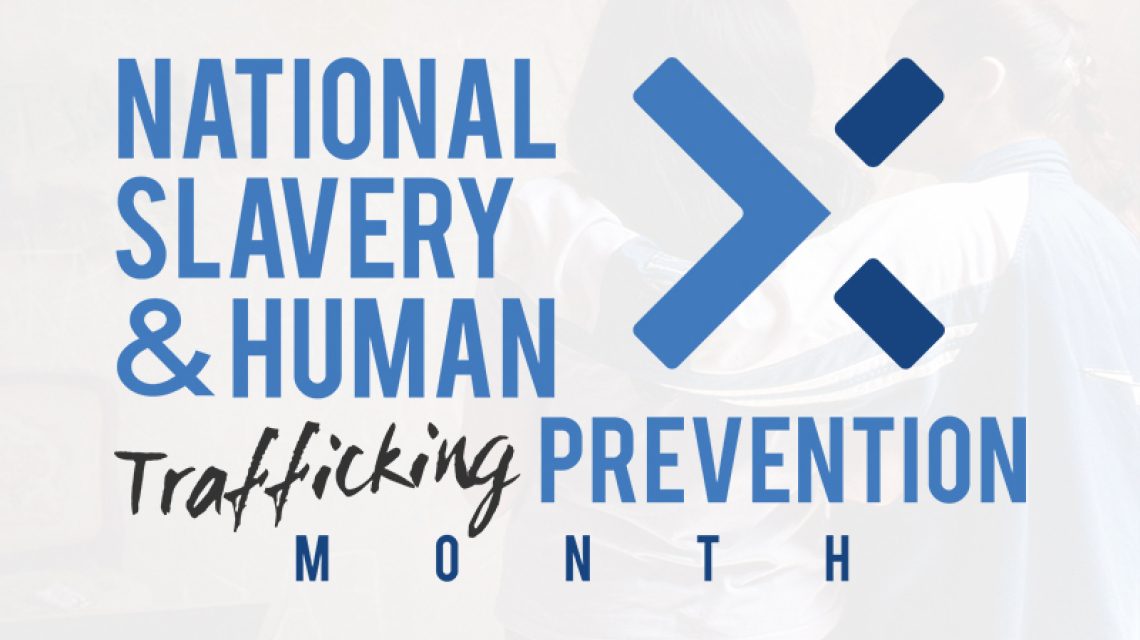National Slavery and Human Trafficking Prevention Month

January is National Slavery and Human Trafficking Prevention Month, created over a decade ago by President Barack Obama to raise awareness about human trafficking, particularly how this crime can be prevented.
Calculated as a $150 billion industry, human trafficking is a form of modern-day slavery and occurs when a trafficker uses force, fraud, or coercion to control another person for the purpose of soliciting labor or services against his/her will. There are an estimated 40.3 million victims of human trafficking worldwide. The elimination of human trafficking is a priority issue for the Catholic Church as every life is a gift from God and is sacred, it deserves to be protected and nurtured.
Convened by the U.S. Conference of Catholic Bishop’s Migration and Refugee Services, the Coalition of Catholic Organizations against Human Trafficking (CCOAHT) consists of more than 35 national and international agencies working to end human trafficking and support survivors. CCOAHT members advocate for stronger state and federal legislation, promote trauma-informed and survivor-centered services for victims, raise public consciousness, and press the private sector and consumers to prioritize slave-free supply chains.
Resources and Ways to Help
- Assist CourageLIVES, Maine's first residential program for women over the age of 18 who have experienced commercial sexual exploitation and need a safe secure place to heal, receive treatment, and start to rebuild their lives.
- Assist Stop Trafficking US. Based in Standish, the organization was established to stop the sexual abuse and exploitation of children in Maine.
- Donate to national trafficking prevention and intervention programs.
- Learn about the Amistad Movement: Like the captives aboard the Amistad slave ship who revolted and won their freedom, the Amistad Movement seeks to empower immigrants in at-risk communities with the educational tools to protect their community members from falling victim to human trafficking.
- Bridging Refugee Youth and Children Services (BRYCS): Recognizing that survivors of trafficking have unique vulnerabilities and require specialized treatment and care, BRYCS works closely with the U.S. Conference of Catholic Bishops’ department of Migration and Refugee Services (USCCB/MRS) to support its mission of providing outreach, education, services, and advocacy on behalf of victims of trafficking-including the most vulnerable-child victims of trafficking.
- Join the Become a Become a SHEPHERD program and incorporate anti-trafficking into your ministries and activities.
- Learn About COMPASS (Coalition of Organizations and Ministries Promoting the Abolition of Slavery at Sea).
- . A prayer to end human trafficking.
Dates to Remember
January 11: National Human Trafficking Awareness Day, a commemoration that seeks to increase understanding among Americans that human trafficking happens in states and communities across the United States.
February 8: International Day of Prayer and Awareness Against Human Trafficking
February 8: Feast Day of St. Josephine Bakhita. Born in the Darfur region of Sudan in 1869, St. Bakhita was kidnapped and enslaved as a child. Eventually she was sold to an Italian diplomat and taken to Italy, where she valiantly asserted her freedom with the help of the Cannossian Sisters of Venice. Through her faith, St. Bakhita realized the promise of liberty inherent in the human spirit. She lived out the rest of her life as a Cannossian sister, sharing her empowering testimony of human freedom and dignity. The Catholic Church has designated her feast as the World Day of Prayer, Reflection, and Action against Human Trafficking.
A Message from Bishop Deeley
It is shocking to consider the size and scope of the tragedy of human trafficking that exists in our world in 2023. Confronted by desperation and fraud, women and men are still exploited through forced prostitution and labor against their will. To be clear, this is modern day slavery that has affected over 40 million people. It cannot be accepted in any decent society.
Human trafficking is a horrific crime against the basic dignity and rights of the human person and requires massive resources and focus at the local, state, and federal levels to eliminate the root causes that allow it to exist. The United States Conference of Catholic Bishops continues to call upon Congress to enact comprehensive immigration reform, which would provide legal avenues for men, women, and their families to enter the country and work legally and safely. Elected officials must collaborate to decisively build pathways that lead to the common good.
Survivors of human trafficking are commonly linked by poverty and a lack of opportunity, particularly immigrants and undocumented workers in the U.S. The selling of people, treated as instruments of gain, takes away all fundamental values rooted in the nature of a human being. As Pope Francis has said, it is a “scourge that wounds the dignity of our weakest brothers and sisters.”
So, what can we do as people of good will to assist survivors and victims? Parishes can offer opportunities to discuss this issue. The diocese is so grateful for programs like CourageLIVES, a division of Saint André Home that is Maine’s first residential program for women who have experienced commercial sexual exploitation and need a safe secure place to heal and rebuild.
Let us resolve as Christians to raise awareness of what is happening in our communities and pray that the victims and survivors of human trafficking find freedom, waiting arms to offer safety, an understanding of their intrinsic value, and a path to healing.









